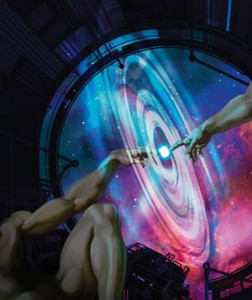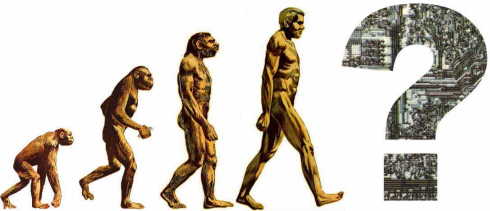 Faith is not exactly a highly esteemed word in the scientific community. Richard Dawkins says faith is belief without evidence. In contrast, the Bible says faith is the evidence of things not seen (Heb 11:1). But what is faith evidence of? The writer of Hebrews is pointing to the fact that there are realities for which we have no material evidence, but they are no less real. Although we have no certainty apart from faith, it enables us to know that they exist with genuine certainty. Specific examples will be given below but to naturalist’s chagrin, science itself is fundamentally founded on faith. In fact, there could be no science at all without this faith. Historian Joseph Needham explains that despite the intellectual and artistic sophistication of China in ancient and medieval times, science never developed there:
Faith is not exactly a highly esteemed word in the scientific community. Richard Dawkins says faith is belief without evidence. In contrast, the Bible says faith is the evidence of things not seen (Heb 11:1). But what is faith evidence of? The writer of Hebrews is pointing to the fact that there are realities for which we have no material evidence, but they are no less real. Although we have no certainty apart from faith, it enables us to know that they exist with genuine certainty. Specific examples will be given below but to naturalist’s chagrin, science itself is fundamentally founded on faith. In fact, there could be no science at all without this faith. Historian Joseph Needham explains that despite the intellectual and artistic sophistication of China in ancient and medieval times, science never developed there:
There was no confidence that the code of nature’s laws could ever be unveiled and read, because there was no assurance that a divine being, even more rational than our-selves, had ever formulated such a code capable of being read. [1]
In other words, the Chinese thought, “Why bother?” If the universe is merely a chance combination of matter, the idea that it would be governed by rational laws seems farfetched. For science to be a reasonable pursuit, then at its very foundation must lie a profound faith in the rational intelligibility of the universe. Honest scientists admit this. For example, Albert Einstein once marveled, “The most incomprehensible thing about the universe is that it is comprehensible”. His astonishment had its fruition in the recognition that the universe doesn’t have to be this way. He wrote further:
Well, a priori, one should expect a chaotic world, which cannot be grasped by the mind in any way… the kind of order created by Newton’s theory of gravitation, for example, is wholly different. Even if man proposes the axioms of the theory, the success of such a project presupposes a high degree of ordering of the objective world, and this could not be expected a priori. That is the ‘miracle’ which is constantly reinforced as our knowledge expands.[2]
Within the confines of naturalism and materialism there is no rational justification for why the laws of physics that work on earth should also apply to the stars trillions of light years away. In like fashion, there is absolutely no logical necessity for a universe that even obeys laws at all, let alone one that abides by the rules of human conceived mathematics. As the example given by Einstein above concerning Newton’s gravity shows, it is not merely the fact that that the universe is intelligible that is amazing, rather it is the mathematical nature of that comprehensibility which is even more miraculous.
Atheistic scientists today take for granted the idea that the universe operates according to humanly comprehensible laws. They have conveniently forgotten the bedrock of faith science is founded upon. Naturalism and materialist philosophies do not account for a rational universe. The idea of a rational universe was first invented by the pre-Socratic Greeks like Pythagoras. However, the concept was diminished by paganism as most Greeks believed the Gods controlled the universe at their ever dramatic whims. It comes down to a worldview issue more than an evidential one. Oxford mathematician and philosopher of science John Lennox writes:
Our answer to the question of why the universe is rationally intelligible will in fact depend, not on whether we are scientists or not, but on whether we are theists or naturalists. Theists will say that the intelligibility of the universe is grounded in the nature of the ultimate rationality of God: both the real world and the mathematics are traceable to the Mind of God who created both the universe and the human mind. It is therefore, not surprising when the mathematical theories spun by human minds created in the image of God’s Mind, find ready application in a universe whose architect was that same creative mind.[3]
That being the case, from where can we trace the origin of this modern scientific faith in the rational intelligibility of the universe? History points to Christianity. In Science and the Modern World Alfred North Whitehead concludes that “faith in the possibility of science … is an unconscious derivative from medieval theology.”[4] Dinesh D’Souza takes this argument a step further by arguing:
Christianity reinvigorated the idea of an ordered cosmos by envisioning the universe as following laws that embody the rationality of God the creator. “In the beginning was the Word, and the Word was with God, and the Word was God.” The term used here for word is logos, a Greek term meaning “thought” or “rationality.” God is sacred and made the universe, and the universe operates lawfully in accordance with divine reason.[5]
The implications of this line of reasoning go much deeper than science’s utter reliance on faith. It also clearly defines the limits of science in a more profound way. The common complaint made by the naturalist about Intelligent Design is that it does not meet their definition of science. But are we searching for truth or are we searching for a rationalization for naturalism? There is truth available outside the scope of narrowly defined reductionist science. It is only one way of obtaining knowledge, not the only way. Mathematical knowledge cannot be known by scientific methods. It is simply discovered and presupposed, while scientific knowledge is gained by sense experience. Sense experience does not justify 1 + 1 = 2. It is self-evidently true and science relies on it. The rules of logic are similar. Truths such as first person introspective knowledge about my own body are much more certain than scientifically derived facts. The problem is deeper than naturalists want to admit.
As it stands today, I contend that by its own rules science is incapable of determining the origin of the universe. Why? The Big Bang theory infers that there was a point in time where everything came into being including time. But that paradoxically includes the laws of physics. Accordingly one cannot coherently use physics to describe the origin of physics. If the universe was produced outside the laws of physics, then its genesis meets the basic definition of the term miracle. Science meet you maker.
[1] Joseph Needham, The Grand Titration: Science and Society in East and West (Toronto: University of Toronto Press, 1969), 327.
[2] Albert Einstein, Letters to Soloivine: 1906-1955 (Yucca Valley: Citadel Publishing. 2000), 31.
[3] John C. Lennox, God’s Undertaker: Has Science Buried God? (Oxford: Lion Publishing, 2007) 61.
[4] Alfred North Whitehead, Science and the Modern World (NY: Simon and Schuster, 1953). 16.
[5] D’Souza,Dinesh.What’s So Great About Christianity, (Washington: Regenery Publishing, 2007), 64.





